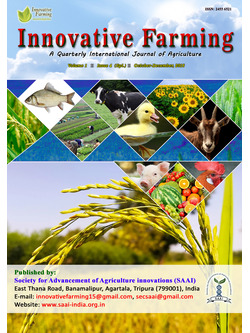
Intervention of Multitasking PGPR in Pulse Production under Stress Conditions
Anandkumar Naorem*
Dept. of Agricultural Chemistry and Soil Science, Bidhan Chandra Krishi Viswavidyalaya, Mohanpur, West Bengal-741252, INDIA
Shiva Kumar Udayana
Dept. of Agricultural Chemistry and Soil Science, Bidhan Chandra Krishi Viswavidyalaya, Mohanpur, West Bengal-741252, INDIA
Gyanendra Kumar
Dept. of Agricultural Chemistry and Soil Science, Bidhan Chandra Krishi Viswavidyalaya, Mohanpur, West Bengal-741252, INDIA
Aritra Kumar Mukherjee
Dept. of Agricultural Chemistry and Soil Science, Bidhan Chandra Krishi Viswavidyalaya, Mohanpur, West Bengal-741252, INDIA
DOI: NIL
Keywords: PGPR, ACC-deaminase, IAA, Nitrogen fixation, Exopolysaccharide
Abstract
Pulse production in India is subjected to different environmental stresses. Moreover, in order to feed the world, increasing production without causing harm to the environment has become the central concept of sustainable agriculture. The intensive use of chemicals pollutes the environment and calls the attention of researchers to figure out alternatives for pulse cultivation in a sustainable manner. Utilization of plant growth-promoting rhizobacteria (PGPR) in pulse production has been reported to be beneficial not only in maintaining the optimum yield but also in cutting down the cost of cultivation. Some of the PGP traits considered especially for pulse production under stress conditions are nitrogen fixation, phosphorus solubilization, sulfur oxidation, production of enzymes such as ACC-deaminase and IAA-like substances, exopolysaccharide production, and bioprotection.
Downloads
not found
Reference
Parray, J.A., Jan, S., Kamili, A.N., Qadri, R.A., Egamberdieva, D., & Ahmad, P. (2016). Current perspectives on plant growth-promoting rhizobacteria. Journal of Plant Growth Regulation, 35(3), 877-902.
